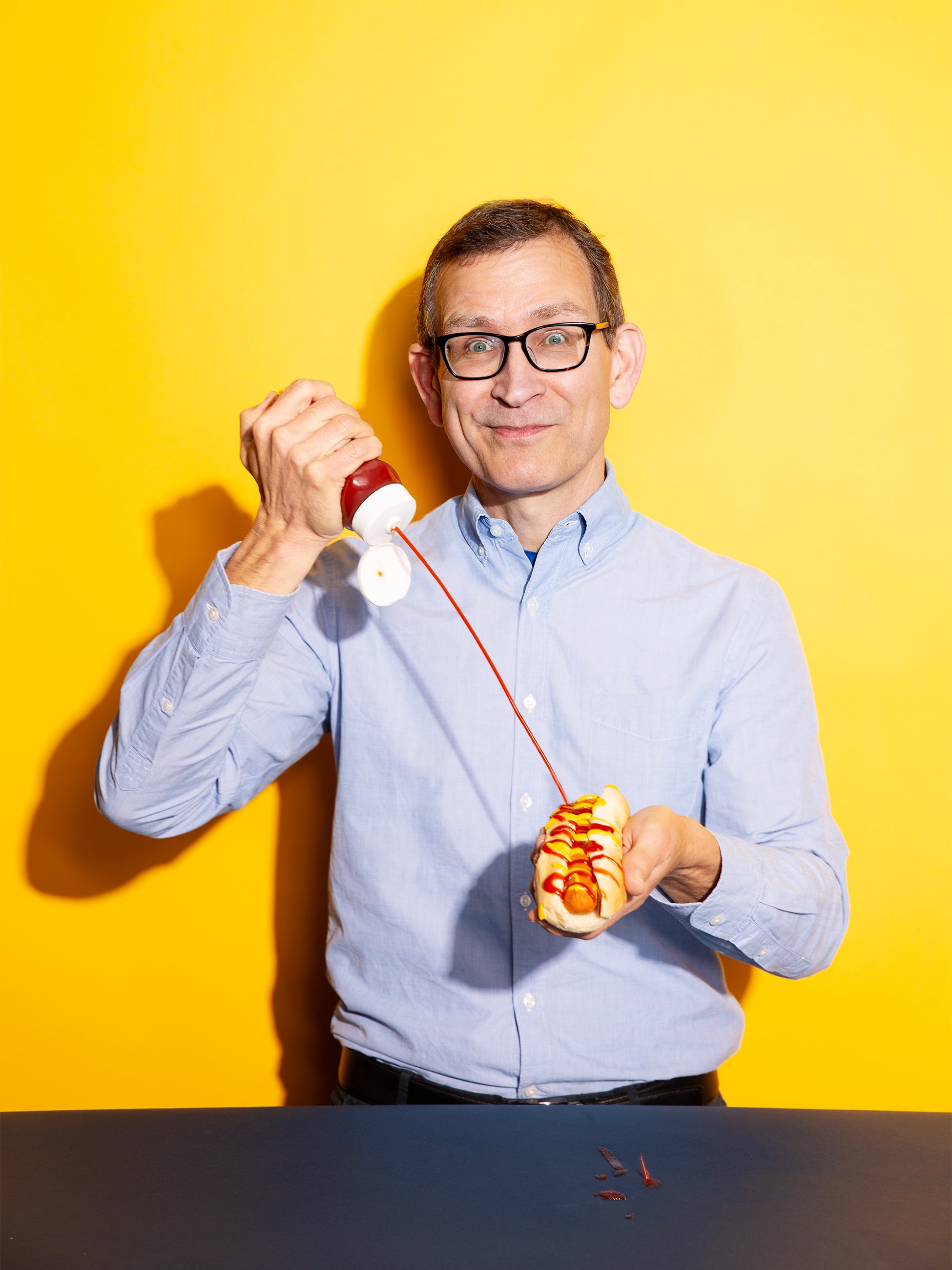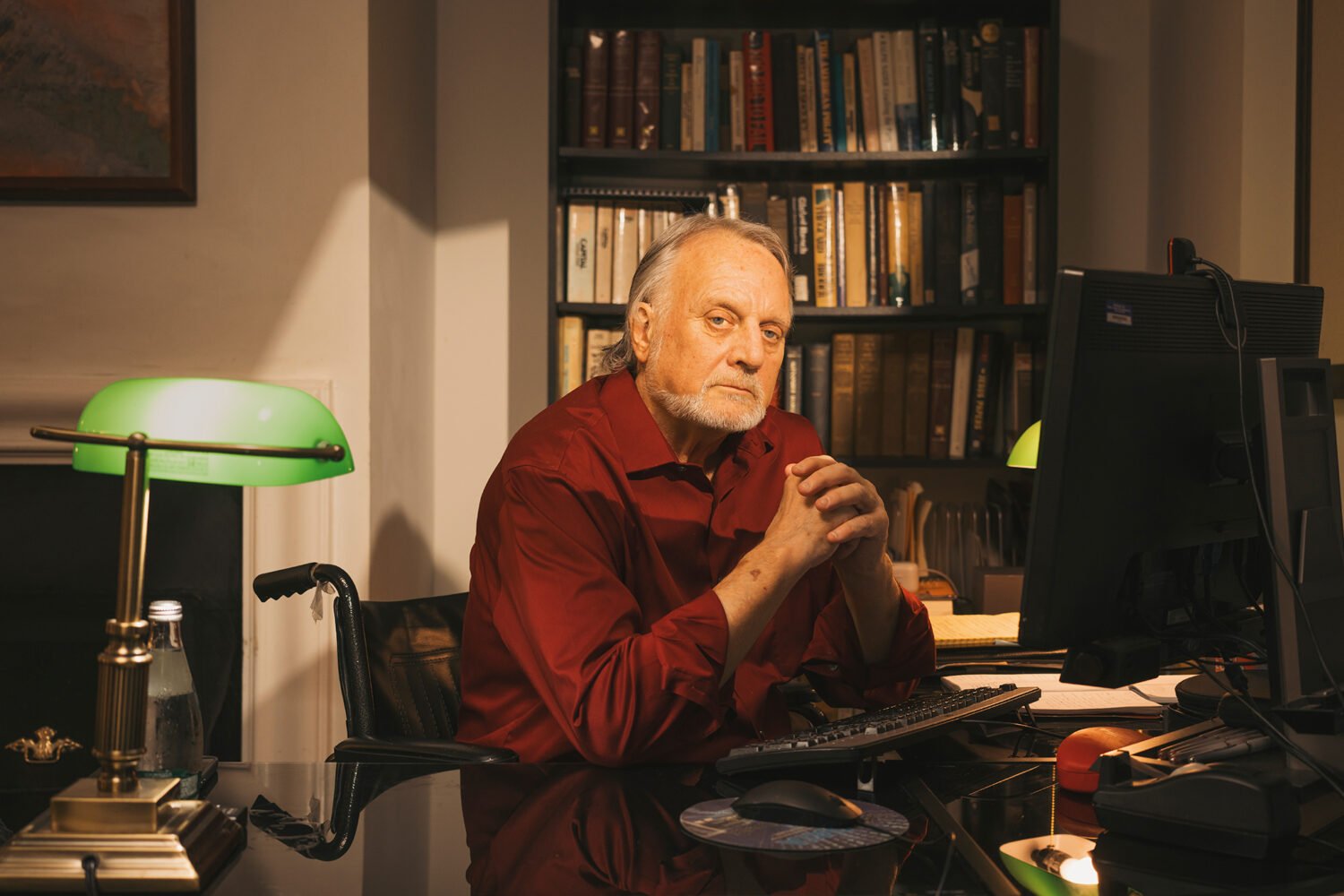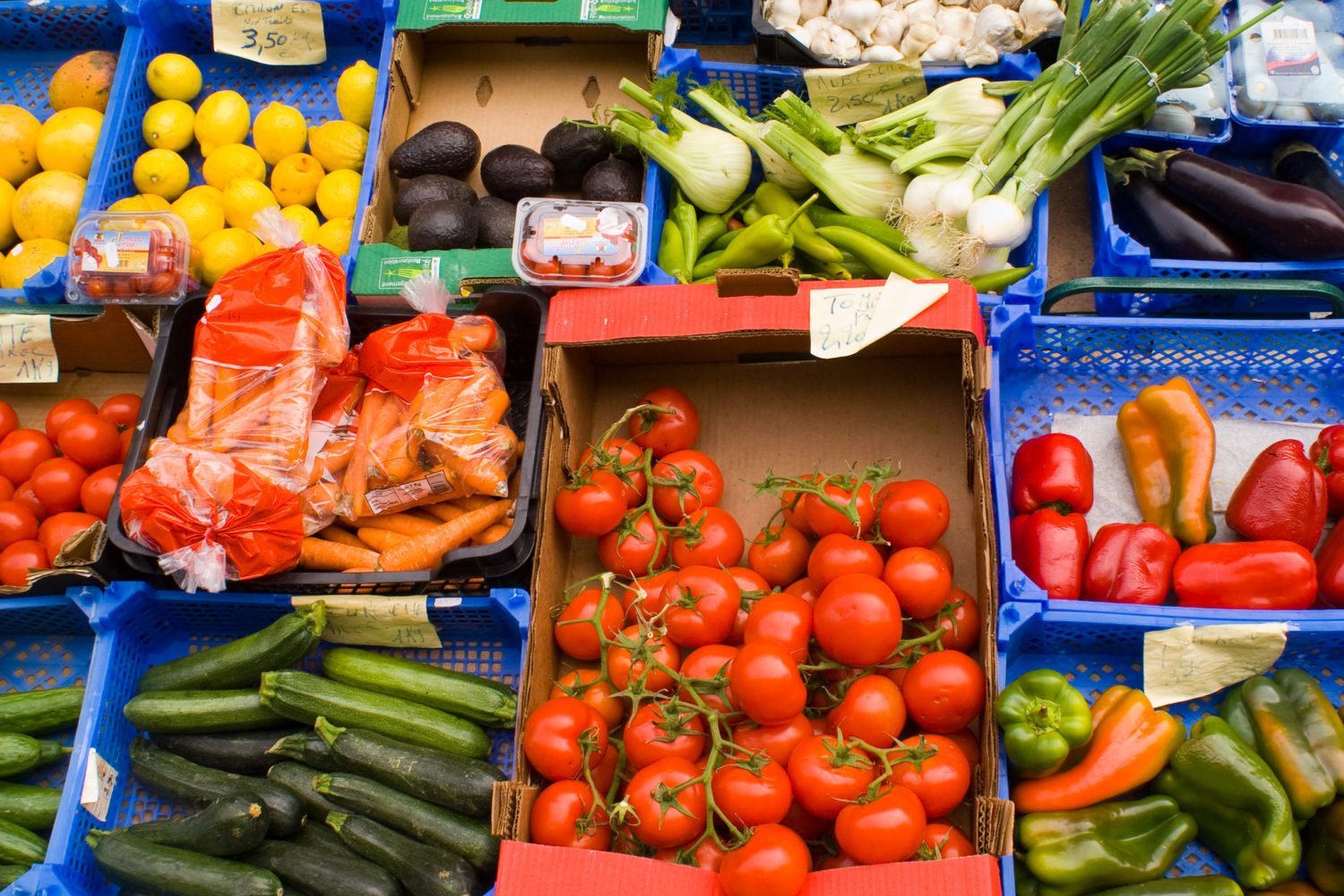A Burger King in suburban Maryland on a Friday afternoon is neither the time nor the place you’d expect to be interrogated about your eating habits. Yet here we are, me and Bruce Friedrich, and he wants to understand my relationship with meat.
“I’m trying to gauge your level of discernment,” he says. “I have a friend who’s a gourmand and he just wouldn’t eat fast-food anything.”
I start with the contents of my freezer: chicken and turkey, skirt steaks and strip steaks, a big chuck roast I plan on throwing into the slow cooker. When my wife and I go out to eat, I tell Friedrich, I generally choose meat entrées. There was also the time I ate nothing but meat for 30 days while reporting a story on the so-called carnivore diet. And yes, I’ll also get a fast-food burger from time to time, though I tend to favor McDonald’s.
Why is Friedrich quizzing me? He’s founder and president of the Good Food Institute, a Washington think tank whose goal, broadly speaking, is to usher meat eaters like me into an alternative future. A future in which livestock isn’t necessary to supply the beef, poultry, or pork at your next barbecue, because it’s been replaced by plant-based imitations or cuts of cultivated meat generated from animal cells and grown in steel tanks.
Before our meeting, I told Friedrich I’d never eaten an Impossible Whopper, the BK burger made from a mixture of soy proteins. So now we’re having a taste test. And unlike my 30 Days of Meat, this isn’t some journalistic stunt. Rather, it’s at the core of how Friedrich hopes to change the world.
In our highly polarized times, the food we eat can be as tribalistic as the vehicles we drive or the words we tweet. Persuasion, even when it comes to our palates, tends to revolve around blaming or shaming. Meat is murder. It’s bad for the planet. Put down the burger. Don’t be a bad person. But who wants moralizing busybodies telling them how to live, especially when how we’re living is, frankly, delicious?
Friedrich places two burgers in front of me: a regular Whopper and the Impossible with the imposter patty. Don’t misunderstand: He wants me to eat less meat. But he doesn’t want to tell me what to do—or harangue me, either. Instead, Friedrich wants me to choose for myself. Painlessly. With flavor, even. I pick up a burger and prepare to bite in.
“People are not going to eat something different,” Friedrich says. “Instead of trying to change human nature, let’s change the food.”
Alternative proteins are having a moment. While the market for them is still a drop in the bucket when compared with conventional meat, sales of plant-based meat products in 2023 surpassed $1 billion—the fifth consecutive year they’ve done so. In a watershed decision last June, the US Department of Agriculture gave two California companies a first-ever green light to sell cell-cultivated chicken in the United States. Shortly thereafter, celebrity chef José Andrés’s DC restaurant China Chilcano became one of the country’s first to offer the lab-grown meat, via grilled skewers marinated in a spicy Peruvian sauce.

The Good Food Institute played a part in bringing cultivated meat from lab to table, as Friedrich and his colleagues have been talking to the feds about doing since 2017. Founded in 2016, the organization has 200 employees, most based in the US, and affiliate offices in India, Brazil, Singapore, Israel, and all over Europe. Its data is routinely cited by large institutions, including the World Health Organization and the UN Environment Program. Until last year, GFI was the main funder of academic research seeking answers to scientific questions around unconventional proteins (the federal government is now number one), and while the institute’s nonprofit status limits its lobbying activities, it regularly speaks with lawmakers on Capitol Hill to help them better understand the alt-meat terrain.
“Without the Good Food Institute, the landscape of alternative proteins—the policies that have been passed to support it, the products that are sold that accelerate it, the consumers that buy it, the capital that’s invested—would be significantly less than it is today,” says Josh Tetrick, cofounder and CEO of Eat Just, a cultivated-meat company in San Francisco.
Friedrich himself is a driving force. “Bruce is absolutely the leader in advocating for alternative meat,” says Andrew Noyes, who spent seven years at Eat Just. “Rewind the clock back more than a decade and alternative protein wasn’t even a thing. He’s put it on the map.” Friedrich’s goal is nothing less than an agricultural revolution, something he considers essential for creating a just and sustainable food system. To get there, however, he’ll need to do more than influence policymakers and advance the science. He’ll need people like me to open our minds—and mouths.
Tall, bespectacled, and clean-shaven, Friedrich is built like a bread stick. Spry at 54, he rides his bike from his Takoma DC home virtually everywhere. He’s a dedicated vegan of 30-plus years, spends Friday nights watching Real Time With Bill Maher along with his wife, and was once a sperm donor to a lesbian couple. He has a law degree from Georgetown and a master’s in education from Johns Hopkins, and he spent a year studying at the London School of Economics.
People who know Friedrich describe him the same way: quirky, unpretentious despite his academic pedigree, unconcerned with creature comforts. For two decades, he drove a beat-up car with windows that didn’t work. When he travels, he eats oatmeal at Starbucks and veggie bowls at Chipotle. He shops at Goodwill, buying clothes only when he really needs them. He works almost all the time. “He’s obsessed and uncommonly focused,” Tetrick says. “And also deeply, deeply kind.”
As an undergraduate at Grinnell College in Iowa, Friedrich was an antipoverty activist. In 1990, he came to Washington and ran the homeless shelter and soup kitchen at the Dorothy Day Catholic Worker House, living onsite and taking a weekly salary of $5. The next year, he converted to Roman Catholicism and was confirmed at St. Aloysius Church on I Street, Northwest. “It’s essential to who I am and everything about me—I take very seriously ‘Act justly, love mercy, and walk humbly,’ ” says Friedrich, referring to a Bible passage.

In 1996, he became vice president of international grassroots campaigns at People for the Ethical Treatment of Animals, a position he held for 13 years. Attempting to socialize the idea of reducing meat consumption through vegetarianism and veganism, he was behind some of the organization’s most notorious stunts. Friedrich hurled fake blood at models wearing fur coats during New York City’s Fashion Week. He tried to get the Green Bay Packers to change their name. He engineered a “Murder King” campaign, calling out Burger King—retroactively ironic, given the company’s embrace of Impossible Whoppers. Anticipating a visit by President George W. Bush, he streaked in front of Buckingham Palace with the website GoVeg.com painted on his body.
Looking back, Friedrich believes his in-your-face tactics “were, and are, changing the zeitgeist.” Eventually, however, he had an epiphany: Neither education nor confrontation would be sufficient to decrease global meat consumption. Meat eaters didn’t need a lecture. They needed a satisfying alternative. “It’s not very fruitful to try to change people’s minds about things,” says Jessica Almy, senior vice president of policy and government relations at the Good Food Institute. “It’s really about making the choice that you want them to make the easy choice.”
The idea for the Good Food Institute came to Friedrich in September 2015. He was standing in line at the Basilica of the National Shrine of the Immaculate Conception, waiting to see Pope Francis. While GFI is not in any way a religious organization, there is a starkly moral element to Friedrich’s work. “He is on a mission for justice,” says Sanah Baig, who was Friedrich’s chief of staff before taking her current role as deputy undersecretary for research, education, and economics at the Department of Agriculture.
Friedrich sees alternative proteins as essential to mitigating climate change and helpful for lessening global hunger. Humans currently consume 380 million tons of meat annually, an amount that’s expected to triple by 2050. Feeding, slaughtering, processing, and dis-tributing livestock already makes up one-fifth of global greenhouse-gas emissions. If alt-proteins don’t become mainstream, Friedrich reasons, there’s no way to keep the planet from dramatically warming.
Meanwhile, developing countries grow and export more than 1 billion tons of corn and wheat and nearly 300 million tons of soy every year to feed livestock worldwide. This arrangement benefits meat eaters in wealthier nations, Friedrich says, but increases food insecurity for poorer people in the places where that feed is grown. The math is the math: One calorie of chicken requires nine calories of feed to produce, while one calorie of beef requires 25.
“What I want to do with my life is take seriously the 2023 version of the works of mercy,” Friedrich says. “Who are the least of us today? And what does it look like to use our privilege to have as big an impact as possible in lessening their suffering?”
In Washington, Friedrich has cultivated bipartisan support. GFI counts Republican senator Mike Lee and Democratic senator Cory Booker as allies—and, perhaps surprisingly, major meat producers like Cargill and ADM have attended the institute’s annual conference. Sonny Perdue, former Secretary of Agriculture under President Trump, is even quoted in GFI’s literature as saying the US must beat China on the issue of alternative proteins.
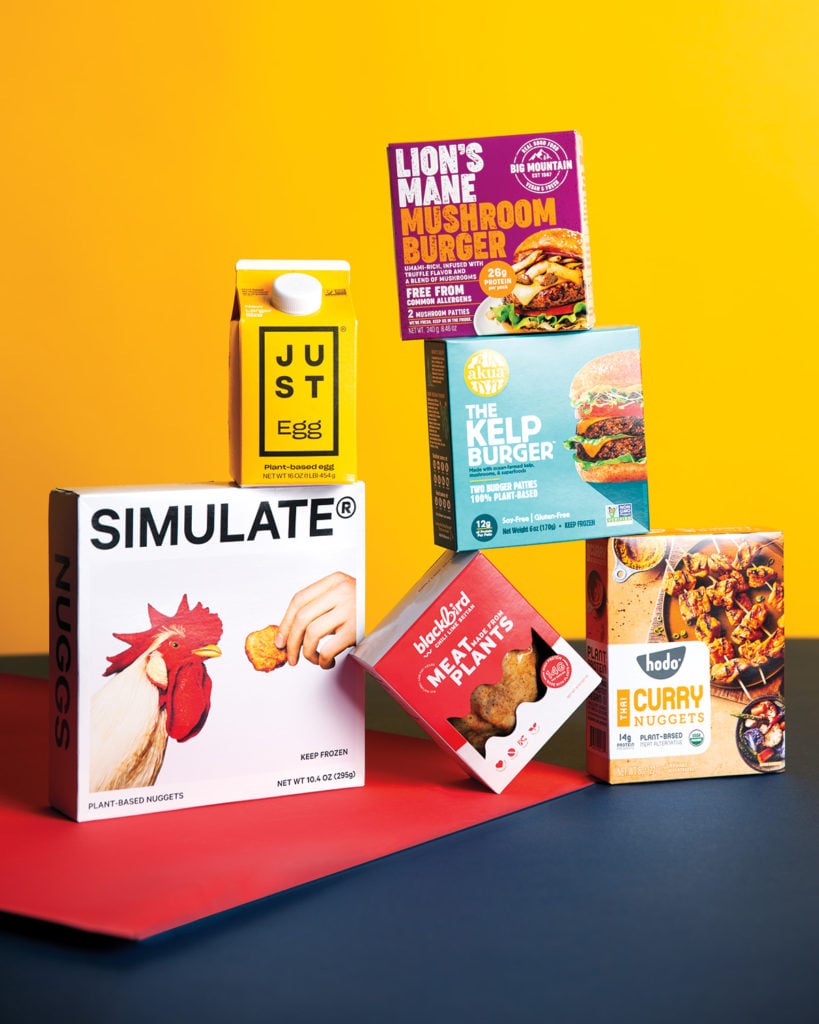
Friedrich wants more. Similar to the global transition to renewable energy and electric vehicles, he says, shifting to alternative proteins will require serious government support. To date, the US has spent just $45 million on alt-meat research and technology; in 2022 alone, other nations spent $635 million. “We need global solutions,” Friedrich says. “And we need those solutions to happen at the level of government policy. We can’t leave this whole endeavor to the private sector.”
There are other challenges. In an Associated Press–NORC Center for Public Affairs Research poll conducted in 2023, half of American adults said they’d be unlikely to try cell-cultivated meat. Asked to choose from a list of reasons why, about half the respondents said they were worried about safety, and most selected “It just sounds weird.” Meanwhile, GFI recently modeled what it would take to have just 6 percent of all the meat consumed worldwide made up of soy or pea proteins—much the way the two biggest US alt-meat companies, Impossible Foods and Beyond Meat, create their products.
The results were, well, impossible: There’s literally not enough coconut oil on Earth to reach that level of production.
“We should be honest—we don’t know if alternative proteins can succeed,” Friedrich says. “Nobody’s ever done it. The products need to compete on price and taste. They never have.”
Friedrich likes to point out the economic opportunity that alternative protein represents: $1 trillion and roughly 10 million jobs if the industry becomes a big business over the next 25 years. But back at Burger King, I can’t help but wonder whether his mission to change food will succeed or fail not with grand arguments in places like Capitol Hill but rather with small, personal choices in places like this—one meat eater at a time.
On to the taste test. I take a bite of each burger. I look at Friedrich and tell him the truth: I really can’t taste a difference. Maybe, I venture, the beef patty is a little gamier.
“Oh, yeah, that is a common observation,” he says. “But one of the other things I have heard is that if somebody’s eating the Impossible Whopper, they won’t know it’s the Impossible Whopper because it’s not distinct enough.”
This, I realize, is what Friedrich is going for. A dutiful vegan, he uses a plastic knife to scrape the cheese off his own Impossible Whopper. “Most people are just not going to eat a bean burger as an alternative to meat,” he says. “But if you can give them the exact same meat experience, that tastes the same or better, with equal or better nutritional value? That’s the ball game, essentially.”
A Burger King in suburban Maryland on a Friday afternoon is neither the time nor the place you’d expect to be interrogated about your eating habits. Yet here we are, me and Bruce Friedrich, and he wants to understand my relationship with meat.
“I’m trying to gauge your level of discernment,” he says. “I have a friend who’s a gourmand and he just wouldn’t eat fast-food anything.”
I start with the contents of my freezer: chicken and turkey, skirt steaks and strip steaks, a big chuck roast I plan on throwing into the slow cooker. When my wife and I go out to eat, I tell Friedrich, I generally choose meat entrées. There was also the time I ate nothing but meat for 30 days while reporting a story on the so-called carnivore diet. And yes, I’ll also get a fast-food burger from time to time, though I tend to favor McDonald’s.
Why is Friedrich quizzing me? He’s founder and president of the Good Food Institute, a Washington think tank whose goal, broadly speaking, is to usher meat eaters like me into an alternative future. A future in which livestock isn’t necessary to supply the beef, poultry, or pork at your next barbecue, because it’s been replaced by plant-based imitations or cuts of cultivated meat generated from animal cells and grown in steel tanks.
Before our meeting, I told Friedrich I’d never eaten an Impossible Whopper, the BK burger made from a mixture of soy proteins. So now we’re having a taste test. And unlike my 30 Days of Meat, this isn’t some journalistic stunt. Rather, it’s at the core of how Friedrich hopes to change the world.
In our highly polarized times, the food we eat can be as tribalistic as the vehicles we drive or the words we tweet. Persuasion, even when it comes to our palates, tends to revolve around blaming or shaming. Meat is murder. It’s bad for the planet. Put down the burger. Don’t be a bad person. But who wants moralizing busybodies telling them how to live, especially when how we’re living is, frankly, delicious?
Friedrich places two burgers in front of me: a regular Whopper and the Impossible with the imposter patty. Don’t misunderstand: He wants me to eat less meat. But he doesn’t want to tell me what to do—or harangue me, either. Instead, Friedrich wants me to choose for myself. Painlessly. With flavor, even. I pick up a burger and prepare to bite in.
“People are not going to eat something different,” Friedrich says. “Instead of trying to change human nature, let’s change the food.”
Alternative proteins are having a moment. While the market for them is still a drop in the bucket when compared with conventional meat, sales of plant-based meat products in 2023 surpassed $1 billion—the fifth consecutive year they’ve done so. In a watershed decision last June, the US Department of Agriculture gave two California companies a first-ever green light to sell cell-cultivated chicken in the United States. Shortly thereafter, celebrity chef José Andrés’s DC restaurant China Chilcano became one of the country’s first to offer the lab-grown meat, via grilled skewers marinated in a spicy Peruvian sauce.

The Good Food Institute played a part in bringing cultivated meat from lab to table, as Friedrich and his colleagues have been talking to the feds about doing since 2017. Founded in 2016, the organization has 200 employees, most based in the US, and affiliate offices in India, Brazil, Singapore, Israel, and all over Europe. Its data is routinely cited by large institutions, including the World Health Organization and the UN Environment Program. Until last year, GFI was the main funder of academic research seeking answers to scientific questions around unconventional proteins (the federal government is now number one), and while the institute’s nonprofit status limits its lobbying activities, it regularly speaks with lawmakers on Capitol Hill to help them better understand the alt-meat terrain.
“Without the Good Food Institute, the landscape of alternative proteins—the policies that have been passed to support it, the products that are sold that accelerate it, the consumers that buy it, the capital that’s invested—would be significantly less than it is today,” says Josh Tetrick, cofounder and CEO of Eat Just, a cultivated-meat company in San Francisco.
Friedrich himself is a driving force. “Bruce is absolutely the leader in advocating for alternative meat,” says Andrew Noyes, who spent seven years at Eat Just. “Rewind the clock back more than a decade and alternative protein wasn’t even a thing. He’s put it on the map.” Friedrich’s goal is nothing less than an agricultural revolution, something he considers essential for creating a just and sustainable food system. To get there, however, he’ll need to do more than influence policymakers and advance the science. He’ll need people like me to open our minds—and mouths.
Tall, bespectacled, and clean-shaven, Friedrich is built like a bread stick. Spry at 54, he rides his bike from his Takoma DC home virtually everywhere. He’s a dedicated vegan of 30-plus years, spends Friday nights watching Real Time With Bill Maher along with his wife, and was once a sperm donor to a lesbian couple. He has a law degree from Georgetown and a master’s in education from Johns Hopkins, and he spent a year studying at the London School of Economics.
People who know Friedrich describe him the same way: quirky, unpretentious despite his academic pedigree, unconcerned with creature comforts. For two decades, he drove a beat-up car with windows that didn’t work. When he travels, he eats oatmeal at Starbucks and veggie bowls at Chipotle. He shops at Goodwill, buying clothes only when he really needs them. He works almost all the time. “He’s obsessed and uncommonly focused,” Tetrick says. “And also deeply, deeply kind.”
As an undergraduate at Grinnell College in Iowa, Friedrich was an antipoverty activist. In 1990, he came to Washington and ran the homeless shelter and soup kitchen at the Dorothy Day Catholic Worker House, living onsite and taking a weekly salary of $5. The next year, he converted to Roman Catholicism and was confirmed at St. Aloysius Church on I Street, Northwest. “It’s essential to who I am and everything about me—I take very seriously ‘Act justly, love mercy, and walk humbly,’ ” says Friedrich, referring to a Bible passage.

In 1996, he became vice president of international grassroots campaigns at People for the Ethical Treatment of Animals, a position he held for 13 years. Attempting to socialize the idea of reducing meat consumption through vegetarianism and veganism, he was behind some of the organization’s most notorious stunts. Friedrich hurled fake blood at models wearing fur coats during New York City’s Fashion Week. He tried to get the Green Bay Packers to change their name. He engineered a “Murder King” campaign, calling out Burger King—retroactively ironic, given the company’s embrace of Impossible Whoppers. Anticipating a visit by President George W. Bush, he streaked in front of Buckingham Palace with the website GoVeg.com painted on his body.
Looking back, Friedrich believes his in-your-face tactics “were, and are, changing the zeitgeist.” Eventually, however, he had an epiphany: Neither education nor confrontation would be sufficient to decrease global meat consumption. Meat eaters didn’t need a lecture. They needed a satisfying alternative. “It’s not very fruitful to try to change people’s minds about things,” says Jessica Almy, public-policy director at the Good Food Institute. “It’s really about making the choice that you want them to make the easy choice.”
The idea for the Good Food Institute came to Friedrich in September 2015. He was standing in line at the Basilica of the National Shrine of the Immaculate Conception, waiting to see Pope Francis. While GFI is not in any way a religious organization, there is a starkly moral element to Friedrich’s work. “He is on a mission for justice,” says Sanah Baig, who was Friedrich’s chief of staff before taking her current role as deputy undersecretary for research, education, and economics at the Department of Agriculture.
Friedrich sees alternative proteins as essential to mitigating climate change and helpful for lessening global hunger. Humans currently consume 380 million tons of meat annually, an amount that’s expected to triple by 2050. Feeding, slaughtering, processing, and dis-tributing livestock already makes up one-fifth of global greenhouse-gas emissions. If alt-proteins don’t become mainstream, Friedrich reasons, there’s no way to keep the planet from dramatically warming.
Meanwhile, developing countries grow and export more than 1 billion tons of corn and wheat and nearly 300 million tons of soy every year to feed livestock worldwide. This arrangement benefits meat eaters in wealthier nations, Friedrich says, but increases food insecurity for poorer people in the places where that feed is grown. The math is the math: One calorie of chicken requires nine calories of feed to produce, while one calorie of beef requires 25.
“What I want to do with my life is take seriously the 2023 version of the works of mercy,” Friedrich says. “Who are the least of us today? And what does it look like to use our privilege to have as big an impact as possible in lessening their suffering?”
In Washington, Friedrich has cultivated bipartisan support. GFI counts Republican senator Mike Lee and Democratic senator Cory Booker as allies—and, perhaps surprisingly, major meat producers like Cargill and ADM have attended the institute’s annual conference. Sonny Perdue, former Secretary of Agriculture under President Trump, is even quoted in GFI’s literature as saying the US must beat China on the issue of alternative proteins.
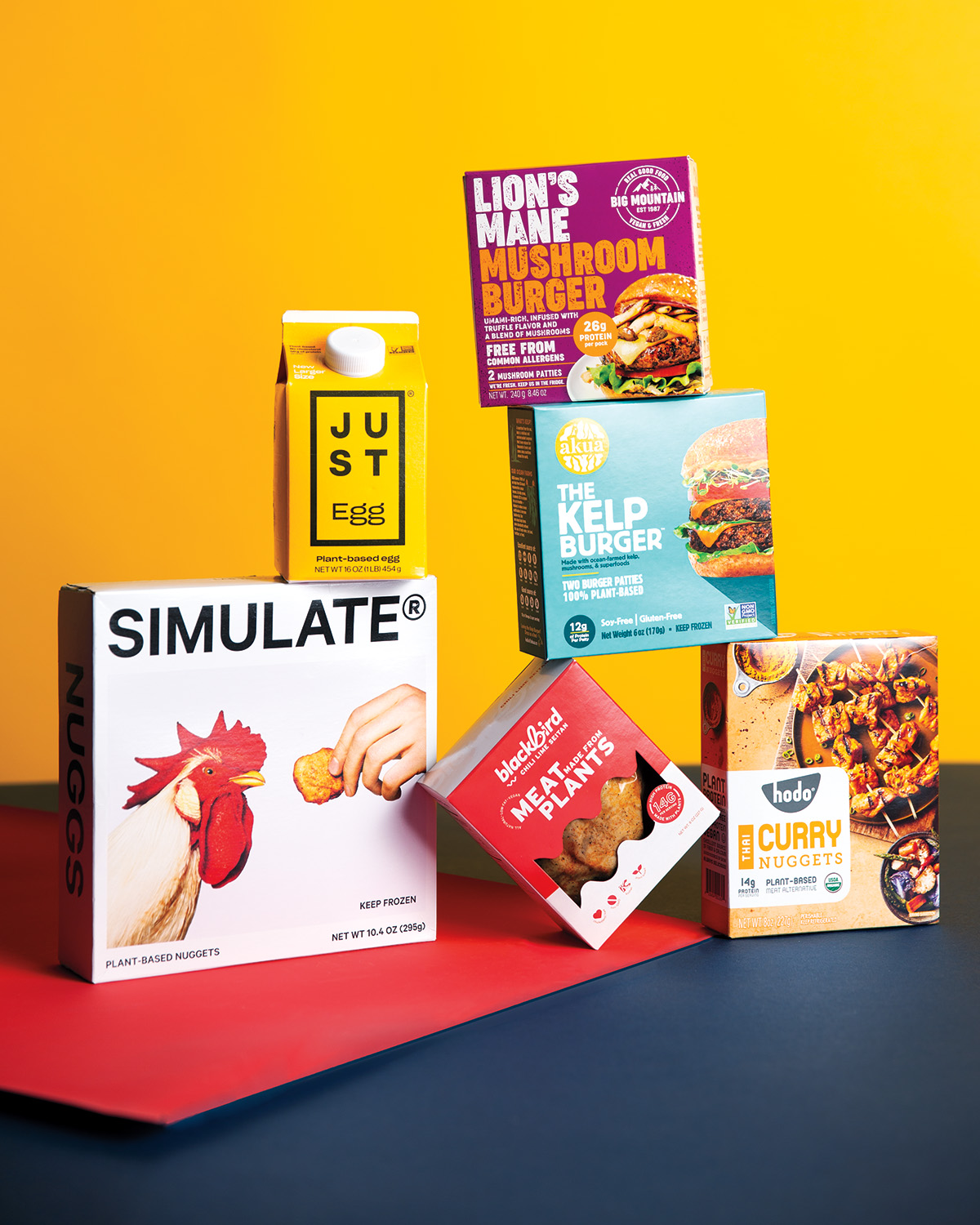
Friedrich wants more. Similar to the global transition to renewable energy and electric vehicles, he says, shifting to alternative proteins will require serious government support. To date, the US has spent just $45 million on alt-meat research and technology; in 2022 alone, other nations spent $635 million. “We need global solutions,” Friedrich says. “And we need those solutions to happen at the level of government policy. We can’t leave this whole endeavor to the private sector.”
There are other challenges. In an Associated Press–NORC Center for Public Affairs Research poll conducted in 2023, half of American adults said they’d be unlikely to try cell-cultivated meat. Asked to choose from a list of reasons why, about half the respondents said they were worried about safety, and most selected “It just sounds weird.” Meanwhile, GFI recently modeled what it would take to have just 6 percent of all the meat consumed worldwide made up of soy or pea proteins—much the way the two biggest US alt-meat companies, Impossible Foods and Beyond Meat, create their products.
The results were, well, impossible: There’s literally not enough coconut oil on Earth to reach that level of production.
“We should be honest—we don’t know if alternative proteins can succeed,” Friedrich says. “Nobody’s ever done it. The products need to compete on price and taste. They never have.”
Friedrich likes to point out the economic opportunity that alternative protein represents: $1 trillion and roughly 10 million jobs if the industry becomes a big business over the next 25 years. But back at Burger King, I can’t help but wonder whether his mission to change food will succeed or fail not with grand arguments in places like Capitol Hill but rather with small, personal choices in places like this—one meat eater at a time.
On to the taste test. I take a bite of each burger. I look at Friedrich and tell him the truth: I really can’t taste a difference. Maybe, I venture, the beef patty is a little gamier.
“Oh, yeah, that is a common observation,” he says. “But one of the other things I have heard is that if somebody’s eating the Impossible Whopper, they won’t know it’s the Impossible Whopper because it’s not distinct enough.”
This, I realize, is what Friedrich is going for. A dutiful vegan, he uses a plastic knife to scrape the cheese off his own Impossible Whopper. “Most people are just not going to eat a bean burger as an alternative to meat,” he says. “But if you can give them the exact same meat experience, that tastes the same or better, with equal or better nutritional value? That’s the ball game, essentially.”
This article appears in the February 2024 issue of Washingtonian.
